Papers by qudsiya contractor
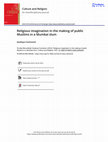
Culture and Religion, 2022
This article looks at how the objectification of religious imagination influences Muslim poor's c... more This article looks at how the objectification of religious imagination influences Muslim poor's coping of their changing worldly realities in a Mumbai slum. It looks at the role of new religious intellectuals in addressing the shrinking Muslim presence in the public sphere in urban India through newer styles of religious leadership embedded in a broader understanding of the religious imagination itself. These new religious intellectuals among the Muslim poor I argue see the role of secular education coupled with a religious imagination as essential in order to protect one's self interests as a Muslim yet be integral to a larger and diverse public. Islamic knowledge and behavioural conduct combined with secular education is hence seen as a way of fashioning the lives of the modern Muslim subject. By describing and analysing how universalistic principles of Islam have been realised in the local context of a Mumbai slum, this article illustrates how, embracing modernity emanating from Islamic values is seen as a way of refashioning the Muslim self.
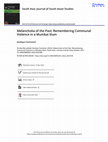
South Asia: Journal of South Asian Studies, 2022
This article analyses how the demolition of the Babri Masjid by Hindu nationalists and the commun... more This article analyses how the demolition of the Babri Masjid by Hindu nationalists and the communal violence in its aftermath (1992-93) is remembered in a predominantly Muslim slum neighbourhood in Mumbai. By drawing on ethnographic fieldwork, it considers how a traumatic event is given meaning through fragmented memories inscribed in the urban space. A nuanced analysis of the recollections of the city's Muslim poor, who faced the main brunt of the violence, suggests that the spatial context of the Muslim neighbourhoods provide a safe social backdrop for the expression of an otherwise suppressed memory that has been pushed by the official narratives of the past into marginality, leading to the creation of an alternative sociality that addresses community concerns to break the hold of the past and imagine a future of peaceful cohabitation.
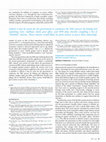
PS: Political Science and Politics, 2021
Almost from the moment of its promulgation, the amendments to India’s citizenship laws have faced... more Almost from the moment of its promulgation, the amendments to India’s citizenship laws have faced protests across the country. From a young Muslim women student from Jamia Milia Islamia stopping a policeman from assaulting a male student to the crowds of women gathered at a Delhi neighbourhood called Shaheen Bagh, the image of resistance to the newly introduced Citizenship Amendment Act (CAA) has become that of a Muslim woman holding the national flag and a portrait of B. R. Ambedkar, the architect of the Indian Constitution. The nature of protests against the amendments to India’s citizenship laws make clear that secularism as guaranteed by the Indian Constitution cannot be just an abstract idea but has to be actualised through democratic process. In this paper, I reflect on the ways in which the feminization of citizenship through these protests transforms the interpretation of secularism and social justice reminding us of the centrality of sentimental passions to citizenship and to the legitimate authority of political community.
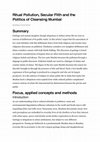
Religion and Urbanity Online, 2020
Garbage and animal slaughter though ubiquitous to Indian urban life are seen as sources of defile... more Garbage and animal slaughter though ubiquitous to Indian urban life are seen as sources of defilement of its public realm. In this article I argue that the association of low caste Muslims with this defilement draws from both religious and secular (nonreligious) discourses on pollution. Hinduism considers cow slaughter defilement and Islam considers contact with body fluids defiling. The discourse of garbage is based on modern considerations of hygiene that are often intertwined and expressed with religious beliefs and idioms. The low caste Muslim becomes the pollutant through a slippage in public discourse. Pollution beliefs are used in a dialogue of claims and counter claims of status. The figure of the low caste Muslim becomes the reason for disorder brought in through the presence of dirt and blood. Such a view hardly takes cognisance of how garbage is produced in a megacity and who are its largest producers. It is the salience of religion in urban public life in India that makes the Muslim basti a ubiquitous socio-spatial form while cultural politics complicated western notions of urban life characterised by distinctions between the private and public.
A. Rao (eds.) Gender, caste and the imagination of equality, Women Unlimited: New Delhi, 2018
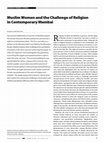
Economic and Political Weekly, 2017
Two recent mobilisations of women in Mumbai expose the tension between Muslim patriarchies and wo... more Two recent mobilisations of women in Mumbai expose the tension between Muslim patriarchies and women’s rights in contemporary Islam. The first case refers to a petition in the Bombay High Court filed by the Bharatiya Muslim Mahila Andolan that challenged the prohibition of women in the inner sanctum of the Haji Ali Dargah. In 2016, the Supreme Court ruled against the governing trust of Haji Ali Dargah and restored women’s right to enter the inner sanctum. The second mobilisation was spearheaded by Sahiyo, a group of five women who started a public conversation around the practice of khafz or female genital cutting among Dawoodi Bohras. Their efforts brought attention to the violent control of female sexual pleasure in the name of religion and tradition. This paper argues that women’s critical voices from within the community challenge conservatism and redefine gendered selfhood within the religious realm.

N. Jayaram (ed.) Social dynamics of the urban - Studies from India, New Delhi: Springer., 2017
This chapter interrogates the secularist notions of Mumbai's public life through the tensions bet... more This chapter interrogates the secularist notions of Mumbai's public life through the tensions between mainstream cityscape as (Hindu) nation-space and Muslim locales as excluded territories. While shared conceptions of locality play an important role in the creation of " imagined communities " , political violence plays a significant role in the way urban localities are ruptured, created and transformed. The violence that followed the demolition of the Babri Masjid in 1992 remains a landmark in the communalisation of Mumbai's landscape. This chapter traces recollections and memories of communal violence decades later, which have come to transform Shivaji Nagar, a predominantly Muslim basti (locality) in Mumbai. Based on ethnographic material, it argues that intense political contestation that juxtaposed notions of nation, locality, community and individual, as experienced during these events is significant to the construction of belonging in Muslim localities. The experience of communal violence has made the notions of belonging to a locality a political process, contributing to the construction of collective identities. The violence not only reconfigured communal identities locally but the transformation of localities and neighbourhoods that followed stands as signifiers of these processes even today.
H. Gorringe, R. Jeffrey and S. Waghmore (eds.) From the margins to the mainstream: Institutionalising minorities in South Asia, SAGE, 2016
Laurent Gayer and Christophe Jaffrelot (eds.) Muslims in Indian cities - Trajectories of marginalisation, London: Hurst & Co., 2012
Economic and Political Weekly, 2012
An ethnography of everyday life in Shivaji Nagar, a predominantly Muslim slum locality in Mumbai,... more An ethnography of everyday life in Shivaji Nagar, a predominantly Muslim slum locality in Mumbai, illustrates how its "Muslimness" complicates the residents' access to water, a commodified and politicised amenity. The struggles of local Muslims to access water also involve holding the state accountable through localised "mundane" politics at the periphery. The state's inability to address the differential access to water is challenged through locally elected political representatives. The paper also explores the role of "intermediaries" who are accused of being the "water mafia" by the state and the English media and argues that they play an important role in making the state accessible through acts of subversion and collaboration.

Journal of Comparative Social Welfare , 2008
Resettlement poses several risks to vulnerable urban populations such as slum dwellers in cities ... more Resettlement poses several risks to vulnerable urban populations such as slum dwellers in cities like Mumbai in the Third World. The causes for involuntary resettlement in the urban context, such as the expansion of airports, widening roads, or building of commercial complexes, are often unconnected to the lives of those living in slums. Resettlement is associated with economic hardships, disruption of the social fabric, and a feeling of uprootment, alienation and psychological trauma. This paper is based on the findings of an action-research study conducted in a resettled slum community in Mumbai, India that aimed to understand the implications of involuntary resettlement from a human rights perspective. It focuses on the impact of involuntary resettlement on issues concerning women's health. It discusses gender differentials in morbidity patterns and the access to healthcare. It argues that there is a need for integrated planning to ensure an improvement in overall living conditions, which also include provision and access to health services apart from just the mere allocation of alternate housing.
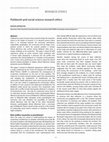
Indian Journal of Medical Ethics, 2008
Fieldwork as a part of social science research brings the researcher closest to the subject of re... more Fieldwork as a part of social science research brings the researcher closest to the subject of research. It is a dynamic process where there is an exchange between the researcher, participants, stakeholders, gatekeepers, the community and the larger socio-political context in which the research problem is located. Ethical dilemmas that surface during fieldwork often pose a unique challenge to the researcher. This paper is based on field experiences during an action research study conducted with a human rights perspective. It discusses the role conflict that researchers face during fieldwork in a situation of humanitarian crisis. It raises issues pertaining to the need to extend the ethical decision-making paradigm to address ethical dilemmas arising during the course of fieldwork. This paper is based on fieldwork experiences (2003-4) during a study conducted by the Centre for Enquiry into Health and Allied Themes (CEHAT) to understand the consequences of involuntary resettlement on the lives of slum dwellers. The study was an action-research project; apart from documenting and studying the implications of resettlement on the community's health, education, work, social security and social life, it was also aimed at supporting the community's efforts to address its own concerns and needs post resettlement. The fieldwork raised certain key concerns. First, researchers were faced with a conflict of roles during data collection in situations of humanitarian crisis-the role of a researcher versus that of an intervener. Second, researchers faced unanticipated ethical dilemmas during the course of fieldwork. Sufficient preparation prior to fieldwork helps anticipate social, psychological and economic risks and, therefore, the possibility of resolving ethical dilemmas with the help of the ethics framework. However, unanticipated ethical dilemmas form a necessary part of fieldwork. Third, it raised certain concerns in the context of conducting social science research in situations of human rights violations. Role conflict: researcher or practitioner? Since the study was aimed at understanding the impact of involuntary resettlement on people's well being and social life, the tools included a self-rating questionnaire developed by the World Health Organization, with 20 questions on general well-being. When we started conducting the interviews, researchers were not prepared for the emotional and mental trauma that women faced as a result of the resettlement. The hardships associated with the resettlement were superimposed onto their already difficult daily life experiences, most of which were already painful. Researchers found that women often broke down towards the end of the interview. They were in a situation that required intervention such as providing emotional support to the women at the end of the interview. Several women also shared problems that were not directly linked to the objectives of the study, and asked for help such as information on social welfare schemes for the differently-abled, legal support for divorce from a violent husband, or employment. Another situation during the course of data collection arose when the community faced an acute water crisis. The area's water connection had been stopped because the bills had not been paid. The amount due was much higher than what the residents could afford. Community leaders suggested that the dues included payment for the water used during the construction of the buildings-which had been wrongly charged to the residents. As a result, residents of the resettlement would have to collect water for washing and bathing from a rainwater-fed stream. Drinking water was bought from a nearby slum. The water prices in the locality eventually soared, leaving the poorest with no option but to use the stream water for drinking. At one point a group of men, women and children, carrying empty water pots, marched off to the nearest ward office to voice their protest against the withdrawal of the water supply. Researchers faced a twofold dilemma. First, it seemed pointless to continue with data collection in a situation where the community was grappling with a crisis. This situation required the researchers to intervene and address the problem. Data collection was withheld till the water problem was resolved. Team members tried to respond to the community's needs. The situation did not change; at any given time of day men, women and children would be walking to the stream with containers to collect water. Others would be sitting waiting for the supply to be restored. Stories of negotiations between the Brihanmumbai Municipal Corporation and community leaders did the rounds of the colony. The team felt increasingly distressed by the fact that they could not do anything to resolve the situation. The expectation of community members that the researchers would do something put the researchers under pressure. They were being forced to go beyond the role of a researcher. They were being forced to intervene in a situation taking place within the area that they were studying.
Book Reviews by qudsiya contractor
The Book Review, Vol. 43, No. 1, 2019
in Hashimpura in the aftermath of communal violence because 'she did not want to make distinction... more in Hashimpura in the aftermath of communal violence because 'she did not want to make distinctions on such an occasion. ' The author fondly recalls how she was socialized to believe that food was a way of forging alliances and making friends across communities and nations. she welcomes the idea that a dish like 'khichdi' could become the national dish of the country but resists the idea of the nation-state prescribing a uniform recipe for it.
Economic and Political Weekly, 2018
Books by qudsiya contractor

Uploads
Papers by qudsiya contractor
Book Reviews by qudsiya contractor
Books by qudsiya contractor